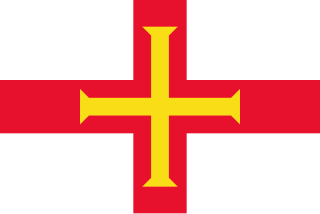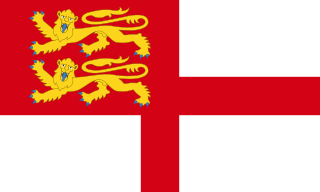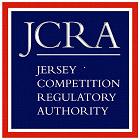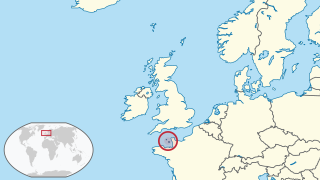Related Research Articles

The Channel Islands are an archipelago in the English Channel, off the French coast of Normandy. They are divided into two Crown Dependencies: the Bailiwick of Jersey, which is the largest of the islands; and the Bailiwick of Guernsey, consisting of Guernsey, Alderney, Sark, Herm and some smaller islands. Historically, they are the remnants of the Duchy of Normandy. Although they are not part of the United Kingdom, the UK is responsible for the defence and international relations of the islands as it is for the other Crown Dependency, the Isle of Man, and the British Overseas Territories. The Crown Dependencies are neither members of the Commonwealth of Nations, nor part of the European Union. They have a total population of about 171,916, and the bailiwicks' capitals, Saint Helier and Saint Peter Port, have populations of 33,500 and 18,207 respectively.

Guernsey is the second largest island in the Channel Islands, located 27 miles (43 km) west of the Cotentin Peninsula, Normandy. It is the largest island in the Bailiwick of Guernsey, which includes five other inhabited islands and many small islets and rocks. The Bailiwick has a population of 63,950, the vast majority of whom live on Guernsey, and the island has a land area of 24 square miles (62 km2).

The history of Guernsey stretches back with evidence of Neolithic occupation, followed by Roman occupation. Christianity was brought to Guernsey by St Sampson.

Politics of Guernsey take place in a framework of a parliamentary representative democratic British Crown dependency.

The Clayton Antitrust Act of 1914, is a part of United States antitrust law with the goal of adding further substance to the U.S. antitrust law regime; the Clayton Act seeks to prevent anticompetitive practices in their incipiency. That regime started with the Sherman Antitrust Act of 1890, the first Federal law outlawing practices that were harmful to consumers. The Clayton Act specified particular prohibited conduct, the three-level enforcement scheme, the exemptions, and the remedial measures. Like the Sherman Act, much of the substance of the Clayton Act has been developed and animated by the U.S. courts, particularly the Supreme Court.

Sark is a part of the Channel Islands in the southwestern English Channel, off the coast of Normandy, France. It is a royal fief, which forms part of the Bailiwick of Guernsey, with its own set of laws based on Norman law and its own parliament. It has a population of about 500. Sark has an area of 2.10 square miles (5.44 km2). Little Sark is a peninsula joined by a natural but high and very narrow isthmus to the rest of Sark Island.

The Crown Dependencies are three offshore island territories in the British Islands that are self-governing possessions of the British Crown: the Bailiwick of Guernsey and the Bailiwick of Jersey, both located in the English Channel and together known as the Channel Islands, and the Isle of Man in the Irish Sea between Great Britain and Ireland.
The Bailiff is the chief justice in each of the Channel Island bailiwicks of Guernsey and Jersey, also serving as president of the legislature and having ceremonial and executive functions. Each bailiwick has possessed its own bailiff since the islands were divided into two jurisdictions in the 13th century. The bailiffs and deputy bailiffs are appointed by the Crown on the advice of the Secretary of State for Justice and may hold office until retirement age.

The Bailiwick of Guernsey is a self-governing British Crown Dependency off the coast of Normandy, France, comprising several of the Channel Islands. It has a total land area of 78 square kilometres (30 sq mi) and an estimated total population of 67,334.
The jurats are lay people in Guernsey and Jersey who act as judges of fact rather than law, though they preside over land conveyances and liquor licensing. In Alderney, however, the jurats are judges of both fact and law in both civil and criminal matters.

The Écréhous are a group of islands and rocks situated six miles (9.6 km) north-east of Jersey, and eight miles (12.8 km) from France. They form part of the Bailiwick of Jersey and are administratively part of the Parish of St Martin.

The Jersey Competition Regulatory Authority (JCRA) is the competition, postal, and telecommunications regulatory authority for Jersey, a British Crown Dependency located in the English Channel.

The External relations of the Bailiwick of Jersey are conducted by the External Relations department of the Government of Jersey. Jersey is not an independent state; it is a British Crown dependency, so internationally the United Kingdom is responsible for protecting the island and for consulting Jersey on international trade agreements but it is not a British territory.

The Bailiwick of Guernsey is a British Crown dependency in the English Channel off the coast of Normandy. As a bailiwick, Guernsey embraces not only all ten parishes on the island of Guernsey, but also the islands of Alderney and Sark – each with their own parliament – and the smaller islands of Herm, Jethou and Lihou. Although its defence is the responsibility of the United Kingdom, the Bailiwick is not part of the United Kingdom, but, as its description suggests, a possession of the Crown. Consequently, though it lies within the Common Travel Area, it was never part of the European Union.

Seigneur or lord is an originally feudal title in France before the Revolution, in New France and British North America until 1854, and in the Channel Islands to this day. The seigneur owned a seigneurie, seigneury, or lordship—a form of title or land tenure—as a fief, with its associated obligations and rights over person and property. In this sense, a seigneur could be an individual—male or female, high or low-born—or a collective entity, typically a religious community such as a monastery, seminary, college, or parish. In the wake of the French Revolution, seigneurialism was repealed in France on 4 August 1789 and in the Province of Canada on 18 December 1854. Since then, the feudal title has only been applicable in the Channel Islands and for sovereign princes by their families.

The history of the Jews in Guernsey dates back to well before the events of 1940–5. A London Jew named Abraham was described in 1277 as being from "La Gelnseye" (Guernsey). A converted Portuguese Jew, Edward Brampton, was appointed Governor of Guernsey in 1482.

The Law of Guernsey originates in Norman customary law, overlaid with principles taken from English common law and French law, as well as from statute law enacted by the competent legislature(s) – usually, but not always, the States of Guernsey.
The Channel Islands Competition and Regulatory Authorities (CICRA) was the name given to the combined Jersey Competition Regulatory Authority and the Guernsey Competition and Regulatory Authority, which operate in the Bailiwick of Guernsey and the Bailiwick of Jersey in the Channel Islands. CICRA existed from 2010 to 2020: the authorities for Guernsey and Jersey now function independently.
The telecommunications in Guernsey relate to communication systems in Bailiwick of Guernsey, which is a British Crown Dependency off the coast of Normandy, France.

The United Kingdom–Crown Dependencies Customs Union or customs arrangements with the Crown Dependencies is a customs union that covers the British Islands. It eliminates all tariff and non-tariff barriers to trade between those islands, and creates a common external tariff with other countries.
References
- ↑ Competition (Jersey) Law 2005 (Appointed Day) Act 2005 R&O 22/2005 (PDF) (Report).
- ↑ States assembly Jersey - Assembly Notices (PDF) (Report). Retrieved 2021-04-11.
- ↑ Streber (2015-04-02). "Jurisdiction Spotlight: Guernsey (and Alderney and Sark) » STREBER Weekly". STREBER Weekly. Retrieved 2021-04-07.
- ↑ "The Channel Islands and the European Union". Channel Islands Brussels Office (CIBO). 2020-02-01. Retrieved 2021-04-11.
- 1 2 "Competition (Jersey) Law 2005". Jersey Legal Information Board .
- ↑ "Jersey competition law – a brief guide to mergers and acquisitions | Lexology". www.lexology.com. Retrieved 2021-04-07.